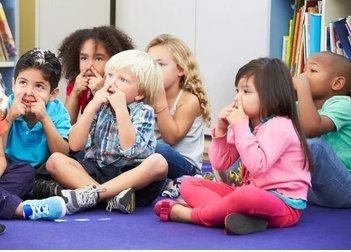How to Get Kids to Stop Touching Their Faces

Source:https://www.parents.com/toddlers-preschoolers/
Children frequently get sick due to constant exposure to germs from peers and shared objects, compounded by their tendency to touch their faces. To prevent the spread of contagious illnesses like colds and the flu, parents can encourage handwashing with soap or using hand sanitizer, and stress the importance of not touching the face. Pediatrician Dr. Jennifer Shu emphasizes that preventing germs from entering the mouth, eyes, or nose is crucial. Keeping kids’ hands busy can help reduce their face-touching habits. While it’s challenging to expect children to completely avoid touching their faces, maintaining good hand hygiene is essential.
Here are a few ideas to curb your kid’s nose-picking, eye-rubbing, and mouth-touching tendencies to help avoid illness:
Have Tissues on Hand: Adults touch their faces about 23 times an hour, and children likely do so even more due to their lack of self-control. To help manage this, parents should keep tissues handy in the car and at home for kids to blow their noses or cover their hands when scratching itches. Dr. Shu recommends frequent handwashing or sanitizing to ensure that if children do touch their faces, their hands are clean.
Give Them Something Else to Do With Their Hands: Many children, as well as up to 91% of adults, pick their noses, often due to boredom, nervousness, or itch relief. This behavior increases the risk of infections like COVID-19 and the flu. To help reduce nose-picking, parents can provide fidget toys, puzzles, or yo-yos to keep children’s hands busy. Additionally, saline nasal sprays can help thin mucus and alleviate a stuffy nose, while treats like fruit pops can occupy their mouths.
Keep Hair Out of Their Faces: Many kids are bothered by hair in their eyes or on their faces, leading them to frequently touch their eyes and noses. To minimize this, it’s advisable to keep hair trimmed short or tied back. Accessories like headbands, bobby pins, barrettes, hats, or plastic tiaras can also help keep hair away from their faces.
Stay Away From Sick People: It’s challenging to prevent kids from interacting with sick friends, but parents can discuss the importance of keeping distance from those who are coughing or sneezing. For exposure in places like a pediatrician’s office, children over age 2 can wear well-fitting masks. Emphasizing outdoor gatherings or playdates can lower the risk of infection transmission. Additionally, encourage open communication among parents about when their kids are sick and contagious.
Read More:https://childreninfobank.com/safebank/how-to-get-kids-to-stop-touching-their-faces/
Image Source:https://www.parents.com/toddlers-preschoolers/





